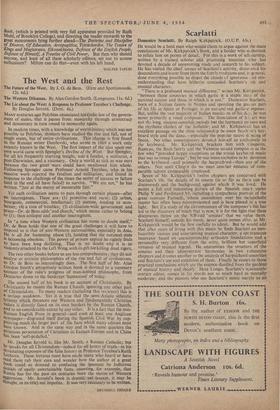The West and the Rest
The Western Dilemma. By Alan Gordon Smith. (Longmans. 1 ls. 6d.) The Lie about the West: A Response to Professor Toynbee's Challenge. By Douglas Jerrold. (Dent. 6s.) MANY centuries ago Polybius enunciated his,cyclic law of the govern- rnent of states, that it passes from monarchy through aristocracy and democracy in turn round to monarchy again.
In modern times, with a knowledge of world-history which was not Possible to Polybius, thinkers have studied the rise and fall, not of single states, but of entire civilisations. This change is first found in the Russian writer Danilevski, who wrote in 1869 a work only recently known in the West. The first impact of the idea upon our own world came with Spengler's Decline of the West. But Spengler, for all his frequently startling insight, was a fatalist, a militarist, a Post-Darwinian, and a visionary. Only a world as sick as was ours between the two great wars could have swallowed him whole. Following Spengler came Professor Arnold Toynbee, who in his massive work rejected the fatalism and militarism, and found in response to the challenge of the times the secret of success or failure (and in the end all have failed) to_survive. "We are not," he has written, "just at the mercy of inexorable fate."
Yet each civilisation seems to pass through certain phases—after an interregnum. These are: (1) primitive and rural; (2) urban, bourgeois, commercial, intellectual; (3) mature, tending to secu- larism; (4) a time of troubles; (5) civilisation-wide government and Peaces—Dr. de Beus adds 'and church,' which seems rather to belong to (1); then collapse and another interregnum.
In "a time when Western civilisation has come to doubt itself," br. de Beus holds that one of the great challenges it will have to respond to is that of anti-Western nationalisms, especially in Asia. He is all for hastening phase (5), holding that the national state is becoming obsolete. The power of private capital he rightly finds to have been long declining. That is no doubt why it is so violently attacked by the Left Wing, with its gift for killing dead tigers.
The two other books before us are less comprehensive; they do not analyse or criticise philosophies of the rise and fall of civilisations, as Dr. de Beus so interestingly does. The first half of Mr. Alan Gordon Smith's attractively written book is devoted to a summary account of the rake's progress of man-centred philosophy, from Descartes down to the bankrupt `humanism' of today.
The sccond half of his book is an account of Christianity. By Christianity he means the Roman Church, ignoring any other part of Christendom. To many readers (including this reviewer) this is serioqs weakness. Yet it is true that the semi-Asiatic atheistic tyranny which threatens our Western and fundamentally Christian values is directly faced on its own borders by the Roman Church, and to no considerable extent by any other. It is a fact that the non- Roman English Press in general—and even at least one Anglican newspaper—disgraced itself during the Spanish Civil War by sup- Pressing much the larger part of the facts which many editors must have known. And in tho same way and in the same quarters the atrocious persecution of Christians in Eastern Europe and in China has been 'soft-pedalled.'
Mr. Douglas Jerrold is, like Mr. Smith, a Roman Catholic; but he speaks for all Christendom—indeed for all lovers of truth—in his devastating exposure of the false history in Professor Toynbee's Reith Lectures. Those lectures must have mcde many who heard or have read them rub their eyes and wonder how the author of a great denials could so descend to confusing the ignorant by ludicrous Russia of easily ascertainable facts, asserting, for example, that Kussia has for the past six centuries been the victim iof Western aggression. Mr. Jerrold's book is drastic, 'yet (except, it may be thought, in its title) not impolite. It was very necessary to be written.


































 Previous page
Previous page